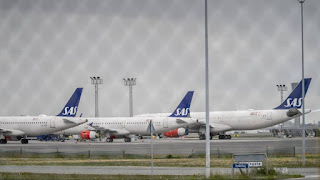Since the lockdown was announced on March 11, the number of calls to the central “Poison Hotline” (DK) about hand sanitizer have been five times as high as usual. Most of them concern people who have gotten the alcohol-based liquid splashed in their eyes, and the rest are cases where someone has drunk it. About half of the latter involve children under the age of five. So far, there haven’t been any cases of serious poisoning of children, though, because the taste is bad enough to make them stop drinking it. “But there are some who deliberately consume large amounts, but those are adults with other problems,” says Paul Frost, head doctor at Bispebjerg Hospital who works on the Poison Hotline.
No good deed goes unpunished
No good deed goes unpunished
The dangers of mistakenly drinking hand sanitizer have had unfortunate consequences for a business that tried to help out during the crisis. When the lockdown took effect, the Wish juice producer from the island of Lolland decided to repurpose its equipment to make sanitizer. Now the Danish Environmental Protection Agency has ordered that the company’s sanitizer be recalled (DK) because it can be mistaken for something consumable. The company stands to lose DKK 2 million USD 300,000) from the recall.
“Other companies were able to make a different package with clear labeling and child-protection features,” says Kim Holm Boesen of the EPA. The owners of the company, Allan and Mette Feldt, say that no one has drunk the sanitizer because they thought it was juice. They explain that they would have used different packaging if it hadn’t been a crisis situation but they believe the packaging was adequate. The EPA concedes that no one has been injured from drinking the sanitizer but explains that it has received several referrals from consumers who are worried about the packaging.
 |
| Wish juice and sanitizer (håndsprit). Photo: TV2 News. |
“Other companies were able to make a different package with clear labeling and child-protection features,” says Kim Holm Boesen of the EPA. The owners of the company, Allan and Mette Feldt, say that no one has drunk the sanitizer because they thought it was juice. They explain that they would have used different packaging if it hadn’t been a crisis situation but they believe the packaging was adequate. The EPA concedes that no one has been injured from drinking the sanitizer but explains that it has received several referrals from consumers who are worried about the packaging.
Appeal to the court of social media
“It is heartrending, and we feel that we are being punished for being socially conscientious and ready to adjust to the situation,” says Mette Feldt. The Feldts do not intend to comply with the EPA’s order to issue a recall letter to the retail businesses that have bought the sanitizer. Allan Feldt hopes “that the government will say that it’s unfair that we and others who have adjusted our production should be stuck with the bill afterwards.”
The Feldts have shared their frustration with the order on Facebook and have received support from several right-wing politicians (DK) who argue that the Minister of the Environment should give the company dispensation from the packaging rules because of the emergency situation. The couple has reputedly made a fortune from selling Aqua d’Or mineral water.
The Feldts have shared their frustration with the order on Facebook and have received support from several right-wing politicians (DK) who argue that the Minister of the Environment should give the company dispensation from the packaging rules because of the emergency situation. The couple has reputedly made a fortune from selling Aqua d’Or mineral water.
Worthless or worse
The heavy demand for sanitizer during the epidemic has led to an increase in imports as well as production by beverage companies. The EPA, working with Customs, has inspected 520 tons of hand sanitizer at the border (DK) and rejected 19 tons, some of it because of insufficient labeling and some because it contained no alcohol. Around half of the faulty imports were sent back to their country of origin and half of them were destroyed because they were considered dangerous.







